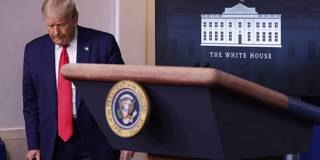US President Donald Trump's mishandling of the COVID-19 crisis has depleted his support among independents and moderates – the groups that will decide the November election. And with the virus raging out of control, he has no good options.
MILAN/STANFORD – Given the stark differences between US President Donald Trump and Joe Biden, his presumptive Democratic challenger, the outcome of the November presidential election will have far-reaching implications not only for the United States, but also for the rest of the world. So should we brace for four more years of Trump, or is change coming?

MILAN/STANFORD – Given the stark differences between US President Donald Trump and Joe Biden, his presumptive Democratic challenger, the outcome of the November presidential election will have far-reaching implications not only for the United States, but also for the rest of the world. So should we brace for four more years of Trump, or is change coming?